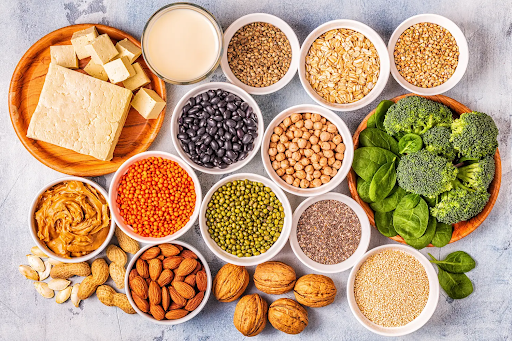Can Plant Based Beef Help You Lose Weight and Improve Heart Health?
Can Plant Based Beef Help You Lose Weight and Improve Heart Health?
Blog Article
Everything About Healthy Food: Benefits of Enjoying Plant Based Choices
The conversation bordering plant-based diet regimens has actually gained significant attention in the last few years. Numerous people are checking out the possible wellness benefits, dietary benefits, and ecological influences related to these nutritional options. As people become extra mindful of their food's impact on health and sustainability, concerns occur regarding the functionalities of adopting such a lifestyle. What details modifications can one expect, and exactly how might these choices reshape not just personal health yet likewise the planet's future?
Understanding Plant-Based Diet Regimens
Numerous individuals associate plant-based diet regimens primarily with vegetarianism or veganism, these diet plans can include a wide array of consuming patterns that prioritize entire, minimally processed plant foods. Such diets commonly include fruits, veggies, entire grains, nuts, seeds, and legumes, while removing or restricting animal items. This versatility allows people to tailor their nutritional options according to nutritional demands and personal choices. Some may take on a mostly plant-based diet while still sometimes consuming meat or dairy, often referred to as a flexitarian technique. The emphasis remains on integrating even more plant foods, which can lead to a varied array of tastes and dishes. Recognizing these various interpretations of plant-based consuming is essential for appreciating its access and appeal in modern food culture.
Health And Wellness Benefits of Plant-Based Foods
The health and wellness advantages of plant-based foods are considerable, providing a nutrient thickness advantage that supports general health. Study indicates that these foods can boost heart health and wellness and play a necessary duty in reliable weight management. By incorporating more plant-based alternatives, individuals might boost their nutritional choices and promote long-lasting health.
Nutrient Density Benefit
Nutrient thickness plays an important duty in the health advantages of plant-based foods, making them a compelling option for those looking for a well balanced diet regimen. Plant-based foods, such as fruits, veggies, beans, nuts, and entire grains, are usually abundant in vital vitamins, minerals, and antioxidants while being lower in calories. This high nutrient thickness permits people to eat fewer calories while still meeting their nutritional requirements. Furthermore, these foods are packed with nutritional fiber, advertising digestive system wellness and assisting in weight administration. By integrating nutrient-dense plant-based options, customers can boost their general health and wellness, support their body immune systems, and reduce the threat of persistent diseases. Ultimately, the nutrient density of plant-based foods underscores their importance in a health-conscious way of living.
Heart Health And Wellness Improvement

Weight Monitoring Assistance
Along with advertising heart health and wellness, a plant-based diet can considerably help in weight monitoring. This dietary method highlights entire foods such as fruits, vegetables, vegetables, nuts, and whole grains, which are usually reduced in calories and higher in fiber contrasted to animal-based products. The high fiber web content assists increase satiation, minimizing total calorie consumption. Moreover, plant-based diets are commonly abundant in crucial nutrients while reduced in harmful fats, making it less complicated to maintain a healthy weight. Sugar Free Sauces. Research shows that individuals who take on a plant-based way of living have a tendency to have lower body mass indexes (BMIs) and experience more effective weight management compared to those that eat meat-heavy diets. Welcoming plant-based options is a strategic choice for effective weight monitoring.
Nutritional Worth of Plant-Based Active Ingredients
Plant-based components are rich in necessary nutrients, providing a diverse variety of vitamins, minerals, and antioxidants that add to overall health and wellness. A comparison of healthy protein resources exposes that while animal products are frequently considered as remarkable, many plant-based choices give ample healthy protein and other useful compounds. Recognizing the dietary worth of these ingredients can help individuals make educated nutritional options.
Necessary Nutrients in Plants
Nutrient-rich components found in plants offer a varied array of essential minerals and vitamins that contribute significantly to general health and wellness. These components are abundant in vitamins A, C, and K, which sustain immune function, vision, and blood clotting, specifically. Furthermore, plants offer vital minerals such as magnesium, calcium, and potassium, critical for heart wellness, muscle mass feature, and bone toughness. The existence of fiber in plant-based foods help digestion and promotes a healthy digestive tract microbiome. Antioxidants, located perfectly in vegetables and fruits, help combat oxidative stress and anxiety and minimize swelling. Several plant foods are low in calories yet high in nutrients, making them an excellent choice for those looking for to maintain a healthy and balanced weight while ensuring suitable nutrient intake.

Comparing Protein Sources
Protein sources differ substantially in their dietary accounts, with plant-based ingredients offering unique benefits. Unlike pet healthy proteins, which commonly include saturated fats and cholesterol, plant healthy proteins often tend to be reduced in these harmful parts. Legumes, nuts, seeds, and whole grains are rich in vital amino acids, fiber, vitamins, and minerals. As an example, lentils supply high protein content together with substantial iron and folate, while quinoa is a total healthy protein, providing all nine important amino acids. Additionally, plant-based healthy proteins are commonly gone Gluten Free BBQ Sauce along with by antioxidants and phytochemicals that sustain overall wellness. The shift to plant-based protein resources not only improves nutritional consumption but additionally lines up with sustainable nutritional methods, decreasing ecological effect and advertising long-lasting health benefits.
Ecological Effect of Plant-Based Consuming
As understanding of environment change expands, many people are exploring sustainable nutritional choices that can substantially reduce their ecological footprint. Plant-based eating has actually emerged as a considerable factor to minimizing greenhouse gas exhausts, which are mainly connected with livestock manufacturing. The cultivation of fruits, vegetables, grains, and veggies generally needs less resources, such as water and land, contrasted to pet farming. Furthermore, plant-based diet regimens can result in reduced logging, as much less land is required for grazing livestock or expanding pet feed. By shifting towards plant-based alternatives, customers can sustain biodiversity and advertise healthier environments. On the whole, welcoming plant-based eating not only benefits personal wellness but likewise stands for an important action towards environmental sustainability and preservation initiatives.
Overcoming Common Misconceptions
While numerous people recognize the benefits of a plant-based diet regimen, several misconceptions typically deter them from completely embracing this lifestyle. An usual belief is that plant-based diets do not have adequate protein; nonetheless, various plant resources, such as beans, nuts, and tofu, offer enough protein. Furthermore, some assume that this diet plan is costly, when as a matter of fact, staples like beans, rice, and seasonal vegetables can be fairly budget-friendly. One more false impression is that plant-based consuming is excessively restrictive, whereas it in fact uses a diverse array of tastes and foods. Lastly, numerous stress that a plant-based diet regimen may lead to shortages, yet with appropriate planning, people can acquire all required nutrients, consisting of minerals and vitamins, while delighting in a wide selection of tasty meals.
Tips for Transitioning to a Plant-Based Way of living
Making the change to a plant-based way of life can be an enhancing experience, though it often requires some guidance to browse the preliminary modifications. People are urged to start progressively, integrating more fruits, vegetables, beans, and entire grains right into their meals while lowering meat and dairy usage. Dish preparation is essential; preparing a regular food selection can aid relieve the adjustment and protect against last-minute undesirable selections. Discovering cooking approaches and brand-new dishes can also preserve and boost the experience exhilaration concerning plant-based consuming. Additionally, joining support system or neighborhoods can give inspiration and share valuable suggestions. Lastly, staying notified regarding nourishment assurances well balanced meals, stopping shortages while cultivating a healthy and balanced, enjoyable plant-based way of living.
Delicious Plant-Based Dish Concepts
Checking out scrumptious plant-based meal ideas can motivate individuals to accept an extra nutritious diet plan. One preferred option is a hearty quinoa salad, including cherry tomatoes, cucumber, and a vibrant lemon-tahini dressing. An additional fave is a tasty lentil stew, packed with carrots, celery, and fragrant herbs, perfect for a soothing dinner. For breakfast, over night oats made with almond milk, chia seeds, and covered with fresh berries provide a nutritious beginning to the day. Additionally, a lively vegetable stir-fry with tofu and a variety of colorful veggies can be a fast yet satisfying dish. Creamy avocado toast on whole-grain bread, sprinkled with seasonings and seeds, offers an easy yet delicious treat. These dishes display the selection and splendor of plant-based consuming.

Often Asked Concerns
Can a Plant-Based Diet Provide Sufficient Protein?
The question of whether a plant-based diet regimen can supply adequate protein prevails. Many sources, consisting of beans, nuts, seeds, and whole grains, can meet healthy protein needs effectively, sustaining a well balanced and nutritious diet regimen for individuals.
Are Plant-Based Diet Regimens Ideal for Kid?
The viability of plant-based diets for children depends on mindful preparation. Adequate nutrients need to be assured, consisting of vitamins, minerals, and proteins. With proper advice, such diet plans can sustain healthy and balanced growth and growth in children.
Exactly how Do I Eat in restaurants on a Plant-Based Diet plan?
Eating in restaurants on a plant-based diet involves seeking restaurants with varied food selections, asking for modifications, and checking out vegan-friendly choices. Planning ahead and interacting dietary choices can enhance the dining experience while keeping nutritional choices.
What Prevail Allergens in Plant-Based Foods?
Common allergens in plant-based foods consist of soy, gluten, nuts, and seeds - Plant Based Beef. Individuals following a plant-based diet regimen should understand these allergens and check out tags meticulously to avoid negative responses and assure secure consumption
Can Plant-Based Diets Assist With Weight Loss?
Research suggests that embracing a plant-based diet plan might promote weight management due to its usually lower calorie density and higher fiber web content. This combination can enhance satiety, helping individuals manage their caloric intake successfully. Many people connect plant-based diet plans primarily with vegetarianism or veganism, these diet plans can encompass a broad array of consuming patterns that focus on entire, minimally processed plant foods. Nutrient thickness plays an important role in the health and wellness advantages of plant-based foods, making them a compelling choice for those seeking a well balanced diet regimen. Plant-based diet regimens have been revealed to substantially boost heart health and wellness, as they commonly include components that sustain cardio function. In enhancement to advertising heart health and wellness, a plant-based diet plan can significantly help in weight monitoring. A typical idea is that plant-based diet plans do not have enough healthy protein; nonetheless, numerous plant sources, such as vegetables, nuts, and tofu, provide enough healthy protein.
Report this page